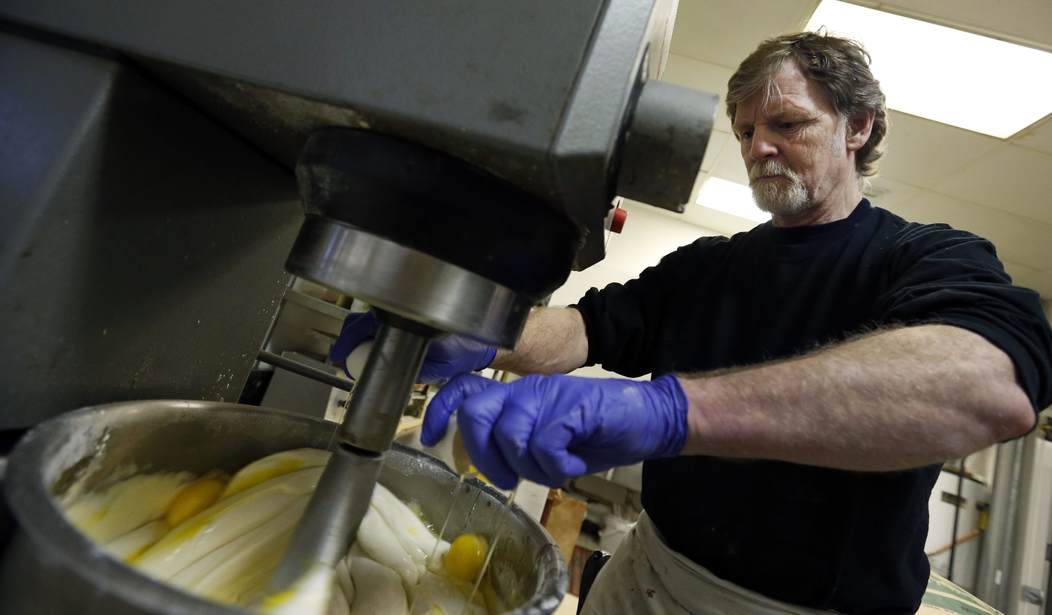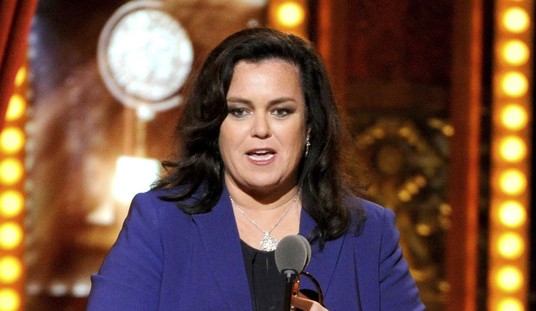On Tuesday night, the Christian legal nonprofit Alliance Defending Freedom (ADF) filed a lawsuit to again defend the Christian baker Jack Phillips, who was targeted by the Colorado Civil Rights Commission for refusing to create cake art celebrating a message that conflicts with his faith. Two months earlier, the Supreme Court ruled in his favor in a similar case.
The mainstream media, unable to ignore the story completely, twisted it out of recognition instead.
So, what actually happened? In 2012, Phillips refused to create an artistic cake celebrating a same-sex wedding, but offered the gay couple anything else in his shop. For this, the commission persecuted Phillips for discrimination on the basis of sexual orientation.
The same commission defended another baker’s right to refuse to create cakes that stated a message with which she disagreed. Worse, the commission compared Phillips’ actions to Nazi apologists, even though Phillips’ own father fought the Nazis and liberated a concentration camp in World War II.
Ultimately, the Supreme Court ruled (7-2) that Colorado had acted with “clear and impermissible hostility toward [Phillips’] sincere religious beliefs.” The Court stuck down the double standard, vindicating Phillips’ right to free exercise of religion against a hostile government.
Yet on June 26, 2017, the very day the Court decided to hear Phillips’ case, a caller — Colorado lawyer Autumn Scardina — requested cake art celebrating a gender transition from male to female. The shop declined the request, as creating such a cake would violate Phillips’ religious beliefs about gender.
A few days later, another caller from a number associated with the name “Scardina” asked for a “birthday” cake for Satan, complete with a red and black theme and an image of Satan smoking marijuana. Phillips denied this cake as well.
On June 4, 2018, the day the Supreme Court issued its decision, someone emailed Phillips claiming to be a “member of the Church of Satan.” The email requested a “three-tiered white cake. Cheesecake frosting. And the topper should be a large figure of Satan, licking a 9” black Dildo [sic]. I would like the dildo to be an actual working model, that can be turned on before we unveil the cake.”
Scardina’s law practice states, “We take great pride in taking on employers who discriminate against lesbian, gay, bisexual and transgender people and serving them their just desserts.”
Scardina complained to the Colorado commission and Colorado found probable cause that Phillips had discriminated against Scardina on the basis of sexual identity. On Tuesday, the ADF filed a lawsuit to block Colorado’s attack.
With that background, here’s how the media bungled the story.
1. Painting Phillips as the aggressor.
Despite Colorado’s well-documented animus against Jack Phillips’ religious beliefs, the media presented the story as if Phillips were the aggressor.
“Colorado Baker Sues Governor Over Cake Dispute With Transgender Woman,” ran the New York Times headline. “Masterpiece Cakeshop owner sues Colorado governor, claiming religious ‘persecution,'” read CNN’s title. “Baker claims religious persecution again — this time after denying cake for transgender woman,” reported The Washington Post. “Colorado baker in case of Supreme Court sues state over ‘persecution,'” the Reuters headline explained.
None of these headlines are technically false, but they presented Phillips as the aggressor, and belittled his claims by putting “persecution” in scare-quotes. The actual articles also inveighed against the Christian baker.
CNN’s Clare Foran and Marlena Baldacci reported, “The Colorado baker who became a national figure after he refused to bake a custom cake to celebrate the marriage of a same-sex couple due to a religious objection and won at the Supreme Court is wading into another legal battle.”
The Associated Press (AP)’s James Anderson put it this way, “A Colorado baker who insisted his religious beliefs justified his refusal to make a wedding cake for a gay couple — an argument partly supported by the U.S. Supreme Court — has sued the state again for opposing his refusal to bake a cake celebrating a gender transition, his attorneys said Wednesday.”
“The baker who won a United States Supreme Court case this year after refusing to make a cake for a same-sex wedding has sued the governor of Colorado, alleging the state discriminated against him when he declined to make a blue and pink cake for a transgender woman,” the New York Times‘ Julie Turkewitz reported.
Time after time, the media cast Jack Phillips in the role of instigator. The baker “is wading into another legal battle”; he has “sued the state again.” Each report presents Phillips as a man out to get Colorado, when in reality this transgender lawyer and the government of Colorado are out to get him.
2. Ignoring the Satan cakes.
Adding to this message of Jack Phillips as the aggressor, each media outlet ignored other salient details in the case. The New York Times, Reuters, CNN, The Washington Post, the Associated Press, and others made not a single mention of the Satan cake requests. They wrote nary a peep on the request for a vibrating dildo in a Satan cake. No jot or tittle was dedicated to the marijuana request.
These scintillating details aren’t just good news hooks — they form key evidence in favor of Jack Phillips’ position. Again, many outlets poo-pooed the idea that Phillips was experiencing “persecution.” Had they included the details of the Satan cakes requested, this attack on the Christian baker would have been far less plausible or effective.
Scardina’s Satan cake requests also help explain the real situation of the story. As previously noted, the transgender lawyer’s own website declares, “We take great pride in taking on employers who discriminate against lesbian, gay, bisexual and transgender people and serving them their just desserts.”
This likely play on words may intentionally bring Jack Phillips to mind among LGBT activists who are incensed at the idea of anyone refusing to bake a cake to celebrate a same-sex wedding. They also reveal the anti-Christian animus at the center of the Supreme Court ruling for Jack Phillips.
It is true that the Supreme Court did not defend Phillips’ free speech rights to refuse to create art that expresses support for an event he disagrees with. Even so, the Court made it crystal clear that anti-Christian discrimination is real, is illegal, and should be condemned. In the book “So Many Christians, So Few Lions: Is There Christianophobia in the United States?” sociology professors George Yancey and David Williamson painstakingly document the presence of bias against conservative Christians, proving that it is as real as animus against Muslims and Jews.
Last year, LGBT mega donor Tim Gill infamously declared, “We’re going to punish the wicked!” He said this in the context of going after people like Jack Phillips who gladly serve everyone but would not lend their creative expression to a same-sex wedding on the grounds that marriage is between one man and one woman.
Similarly, Hillary Clinton herself compared this kind of opting out of celebrating LGBT events to honor killings and female genital mutilation.
Animus against conservative Christians exists, and by refusing to mention the Satan cake requests, the mainstream media is helping silence the documented bias against conservative Christians. This persecution pales in comparison to anything happening in North Africa, the Middle East, India, and other parts of the world, but it is real, and the media should not ignore it.
3. Misrepresenting the denial of service.
In stories about this case, the mainstream media again misrepresented the fundamental issue involved. Jack Phillips did not refuse the same-sex couple or the transgender lawyer because of their sexual orientation or their transgender identity, but because he disagreed with the message they were asking him to convey.
As the ADF lawsuit explains, “All people—no matter who they are, what they believe, or what protected characteristics they have—are welcome in Phillips’s shop and may purchase anything available for sale.” So why the denials? “As a devout man of faith, Phillips cannot create custom cakes that express messages or celebrate events in conflict with his religious beliefs. When a customer asks him to create such a cake, he cannot do it, no matter who requests it.”
This key distinction is vital to Phillips’ case and to so many others, and yet article after article could not get it right.
The New York Times‘s Julie Turkewitz wrote, “The lawsuit sets up yet another public battle involving Jack Phillips of Masterpiece Cakeshop over whether claims of religious freedoms can be used to refuse services to gay and transgender people” (emphasis added). No, the case is about the message, not the people.
The AP’s James Anderson reported, “Scardina said she asked for a cake with a pink interior and a blue exterior and told Phillips it was intended to celebrate her gender transition. She did not state in her complaint whether she asked for the cake to have a message on it” (emphasis added).
Anderson’s addition here is absurd. Earlier in his article, Anderson admitted that Phillips had refused “to make a cake celebrating [Scardina]’s transition from male to female.” Furthermore, he described the cake as “a gender transition cake.”
Whether or not the cake had a message in icing such as, “Happy transition!” or “Congratulations on being a woman!” is irrelevant. As Anderson himself reported, quoting from the lawsuit, Phillips believes that “the status of being male or female … is given by God, is biologically determined, is not determined by perceptions or feelings, and cannot be chosen or changed.”
The cake itself, in its clear context, expresses a message opposite this belief. It does not matter at all whether Scardina wanted any further message or not — and Anderson suggesting that it does merely feeds into the Colorado Civil Rights Commission’s bogus argument.
Reuters’ Keith Coffman uncritically cited that argument. He quoted Aubrey Elenis, the director of the state’s Civil Rights Division. “The evidence thus demonstrates that the refusal to provide service to [Scardina] was based on [the lawyer’s] transgender status,” Elenis wrote in a probable cause determination.
Not only did Coffman leave out Phillips’ own beliefs about gender, but he also gave the last word to Daniel Ramos, executive director of the LGBT group One Colorado. Ramos attacked Alliance Defending Freedom (ADF).
“We have seen the ADF launch similar lawsuits across the country that target nondiscrimination laws and civil rights agencies, and this broad lawsuit they filed on behalf of Jack Phillips reads as more of the same,” Coffman quoted Ramos as saying.
Perhaps surprisingly, CNN at least rightly presented Phillips’ side of the story, noting that the baker refused to create the transgender cake “because it would have celebrated messages contrary to his religious belief.”
A silver lining: No “hate group” smears.
Despite the anti-Phillips slant in most of these stories, one feature of the liberal narrative was notably absent. The Southern Poverty Law Center (SPLC), a left-wing smear group that brands conservative and Christian organizations “hate groups” for disagreeing with their policy aims, has falsely branded Alliance Defending Freedom a “hate group.”
Last year, the media uncritically took up this label against ADF. While each of the stories cited above misrepresented the case involving Jack Phillips and Autumn Scardina, none of them repeated the “hate group” smear against ADF.
Follow the author of this article on Twitter: @Tyler2ONeil.









Join the conversation as a VIP Member